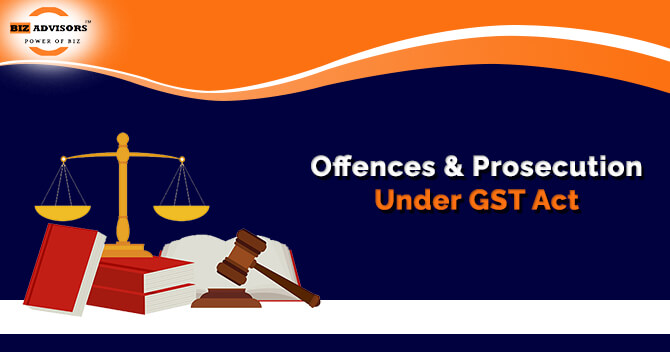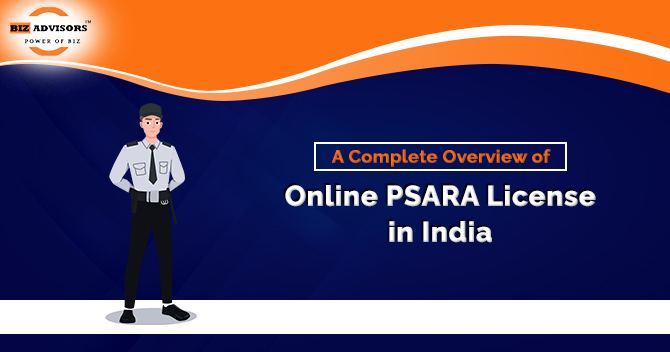When used in this context, the word “prosecution” refers to a formal accusation made before the start of any prosecution. The prosecution during the pre-GST period is governed by various fiscal laws; however, with the passage of the Goods & Service Tax Act, of 2017, prosecution during the GST era would be initiated in accordance with the established requirements. Additionally, the central government published thorough guidance on the GST Act prosecution process on September 1, 2022. Offenses and Prosecution under the GST Act is the beginning of legal action against someone who intentionally or deliberately avoids paying taxes. The act includes measures for prosecution, although the disobedient taxpayer may still face charges under normal laws. In this article, we will discuss offenses and Prosecution under GST Act.
Offenses listed other than Sections 73 and 74 of the CGST Act
The following offenses are also covered by Section 122(1) of the CGST Act in addition to Sections 73 and 74. An authorized departmental authority may apply the appropriate punishment when a taxpayer engages in any of the following violations. According to Section 122(1), the following offenses are prohibited:
- When a provider delivers any products or services, or both, without issuing an invoice, or when they do so while issuing a fake or inaccurate invoice for each supply
- Creates a bill or invoice without actually supplying the products, services, or both.
- A person who is permitted to collect any amount of tax but who, after three months have passed since the date the tax was collected, fails to pay the government the amount of tax collected
- Anyone with the authority to collect taxes of any kind but who disregards Section 51’s requirement to deduct taxes (1). The Section will also be applicable if someone deducts less money than is necessary to pay the government.
- The relevant individual fails to pay the government and obtains less money than what is required under Section 52(1).
- The taxpayer uses or takes advantage of the input credit tax without first receiving any products, services, or both, in full or in part.
- Somebody who has the right to collect taxes but who cheats and gets a refund
- A person who has the authority to collect tax does so, but they distribute the revenue in contravention of Section 20 or any other Act provisions.
What is the penalty for a GST prosecution?
The act’s Section 132 specifies the penalties for offenses that fall within Subclause 1 of Section 132. It outlines the penalties for prosecution under the GST and establishes the severity of the punishment based on the level of tax evasion. Anyone who violates the law or keeps the proceeds will be penalised in accordance with the following standards:
- Tax evasion that exceeds Rs. 5 crore is punishable by five years in prison and a fine.
- 250 lakh rupee repeat offense: five years in prison and a fine
- Tax evasion between $2 million and $5 million is punishable by three years in prison and a fine.
- One year in prison and a fine are the penalties for tax evasion between one and two crores.
- False records carry a six-month prison sentence.
- Officer obstruction: six months in prison
- 6 months in imprisonment for falsifying records
What are the Cognisable and Non-Congnisable offenses under the GST?
Cognizable offenses are those for which the concerned officer is permitted to take cognizance of the offenses without obtaining a warrant, as opposed to non-cognizable offenses for which the officer must obtain a warrant from the concerned officer.
Congnisable Offence:
According to Section 132(5) of the Act, if the tax evasion for the offenses listed under 1, 2, 3, and 4 above exceeds Rs 500 Lakh, it is a cognizable and non-bailable offense.
Non-cognizable offence:
All offences other than those listed in Section 132(5) are non-cognizable and bailable, according to Section 132(4) of the Act. Therefore, if the amount of tax evasion is less than Rs 500 Lakh, all offenses under the GST Act are non-cognisable and bailable.
Who will approve the cognisance of an offense for GST prosecution?
Any offence listed in Section 132(1) may only be pursued against a suspect with the commissioner’s prior consent. The legislation under Section 134 further stipulates that the court can only take cognizance if the commissioner has already sanctioned it. The provision further stipulates that a First Class Magistrate will preside over the trial.
What is Compounding of offense?
Compounding offences is a quick way to avoid going to court. The accused must appear before the Magistrate at each hearing when they are being prosecuted for an offence in a criminal court through an attorney. Court cases take a lot of time and money. The accused is not needed to personally appear during compounding and may be released upon payment of a fee, which cannot exceed the maximum fine allowable under the applicable regulations. The GST Act also permits offences to be compounded.
The amount for the Offense’s Compounding Clause 138 (2):
The following amounts shall be used to compound an offence:
- A minimum of Rs 10,000 or 50% of the unpaid tax, whichever is higher.
- A minimum of Rs. 50,000 or 150% of the unpaid tax, whichever is higher.
- In addition, Section 138(3) of the Act states that after the compounding sum is paid, any prosecution procedures against the person should cease.
Conclusion – Offenses and Prosecution Under GST Act
For the official creation of a case for the evasion of all indirect taxes, the Offenses Prosecution under the GST Act statute offers uniform criminal penalties. All indirect taxes are governed by the GST act[1], a single fiscal instrument. The burden of proof falls on the accused rather than the accuser in offenses requiring culpable mental state, hence the prosecution process needs to be more workable. It is also important to note that second and subsequent offenses are exempt from the monetary cap on tax evasion. Seek professional advice to get to know more about Offences and Prosecution under GST Act. You can also reach Bizadvisors.io for more information.
Read our article:Consequences for Non-Filing of GST Returns in India: A Complete Overview
 9559179325
9559179325 9559179325
9559179325





